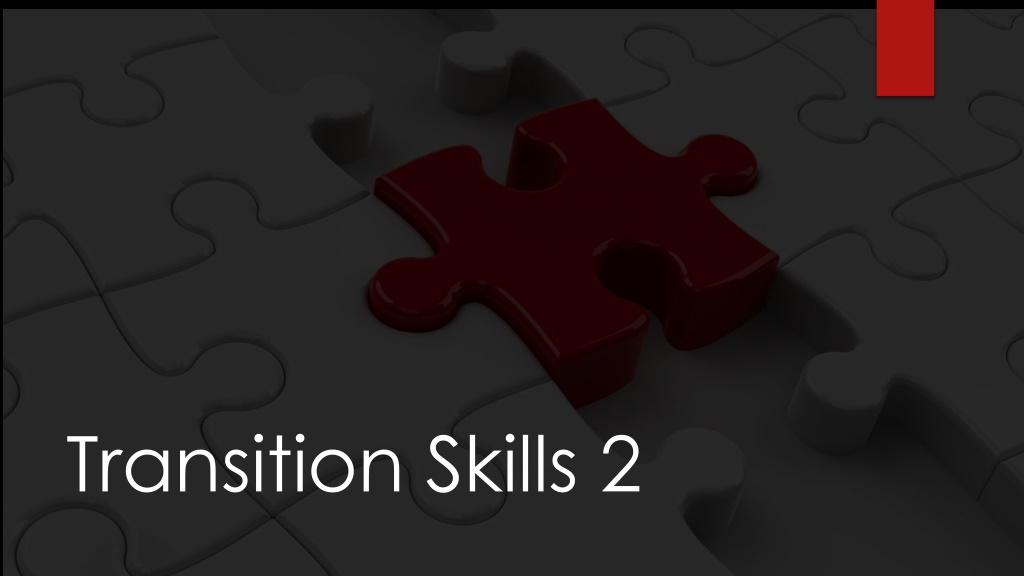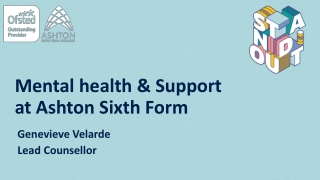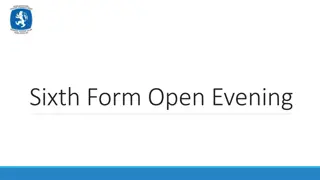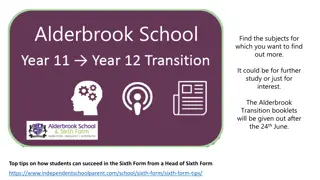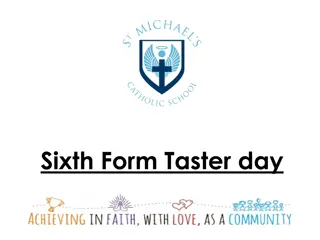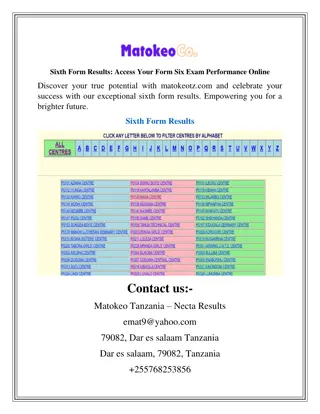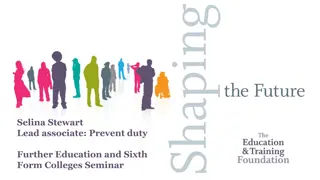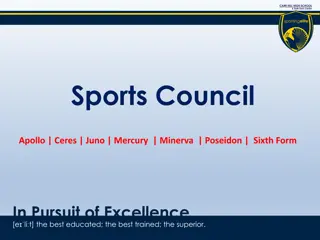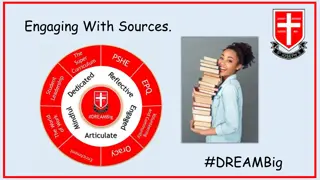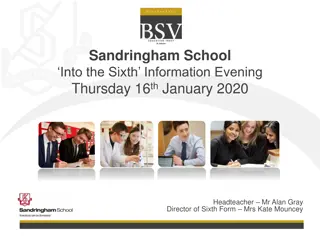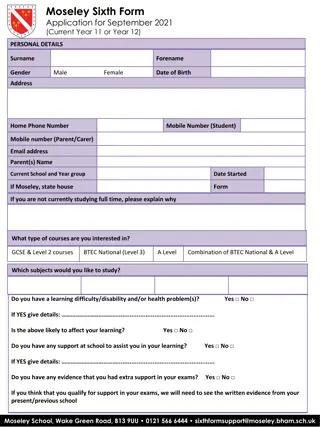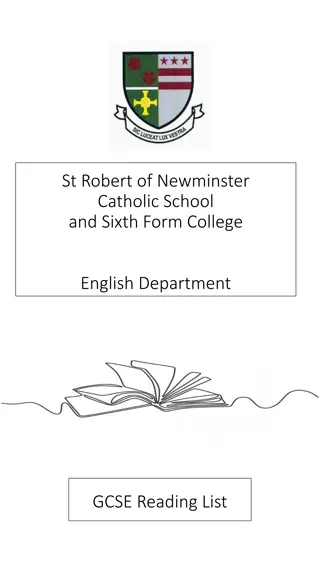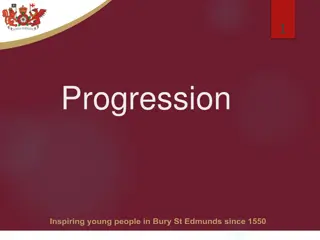Understanding Success in Sixth Form Education
Exploring the differences between studying at GCSE and A level, this discussion emphasizes the essential skills for success in Sixth Form, beyond academic achievements. Contrary to common beliefs, intelligence and GCSE performance do not dictate A level success. Instead, the focus is on developing intangible skills and qualities that lead to a fulfilling academic journey and open doors to future opportunities. The session challenges stereotypes and uncovers the real factors that contribute to becoming a successful Sixth Former.
Download Presentation

Please find below an Image/Link to download the presentation.
The content on the website is provided AS IS for your information and personal use only. It may not be sold, licensed, or shared on other websites without obtaining consent from the author. Download presentation by click this link. If you encounter any issues during the download, it is possible that the publisher has removed the file from their server.
E N D
Presentation Transcript
What do you think are the real differences between studying at GCSE and studying at A level?
Mr Robinson is running the Transition Skills 1 session which looks at the more tangible skills that are important to develop in Sixth Form Notetaking Organisation Wider reading Avoiding plagiarism But I am going to be looking at the additional skills that lead to success that are much harder to quantify....
Today we are going to be looking at what makes a successful Sixth former Why do we want you to be successful and ultimately, why should you want to be successful? Great A level and BTEC exam results are currency for access to opportunities that will lead to well paid, fulfilling jobs This in turn allows you to lead the life that you want to lead
With a partner write on your post-it note what you think would make someone a successful sixth former
About what makes a successful sixth former
You have to be highly intelligent
You have to be highly intelligent
You must have done exceptionally well in your GCSE's
You must have done exceptionally well in your GCSE's
Let's address what evidence there is for this... Researchers have found that there is no link between a student's IQ and their A level results They have also found that there is no link between success at GCSE's and A level results Some students make giant strides in progress when they get to sixth form and others hit a ceiling and don't make progress it does not matter what GCSE grades people got for this to happen
How did they do this research? They studied sixth formers over a number of years and put them into two categories: Breakthrough students: exceed their target grades Ceiling students: underperform in their target grades
Breakthrough and Ceiling students The researchers wanted to find out what the difference was between these two types of students They analysed both types of students using questionnaires and observations in lessons Their GCSE grades were analysed What they found was that..... Past performance didn't seem to guarantee future performance
Breakthrough and Ceiling students There were no specific cognitive weaknesses that predetermined poor performance at A level What the researchers found really interesting was the qualitive data which showed what made a Breakthrough Student or a Ceiling Student
What did they find out? Breakthrough students tended to: Make detailed notes Had tidy and organised files Were committed to independent study Ceiling students didn't have these qualities
The good news is that all these qualities of Breakthrough students can be learnt One of the biggest keys to success is Grit What do you think this means? 'Perseverance to accomplish long term goals in the face of challenges and setbacks' Angela Duckworth is going to talk about Grit https://www.ted.com/talks/angela_lee_duck worth_grit_the_power_of_passion_and_persev erance?language=en#t-121937
Grit Angela Duckworth believes that the trait of Grit, which has nothing to do with intelligence, is key to success and is a stronger predictor of success than intelligence
So, successful students have the following qualities: Perseverance, resilience and grit Confidence and optimism Motivation, drive and ambition Tolerance and respect Honesty, integrity and dignity Conscientiousness, curiosity and focus
The research showed that it is these behaviours, habits, and attitudes that determine a students success Do you recognise these qualities in yourself? Don't worry if you don't, these can all be learnt! In the course of Year 12 you are going to go through these qualities and practice and reflect on them
VESPA these are the qualities you will be learning throughout Year 12 Vision = you know what you want to achieve Effort = you put in many hours of proactive and independent study Systems = you organise your learning and resources and time Practise = you practise and develop your skills Attitude = you respond constructively to setbacks Ceiling students have significant gaps in one or more of these characteristics Breakthrough students score highly in these make significant breakthroughs at A levels, unlocking performance and outstrip their target grades
We are going to have a go at some of the activities that will help you develop some of these skills
Vision what is it and why is this important? This doesn't necessarily mean that you know what your career path is It is about knowing the outcomes you want to achieve If you don't know why you are doing A levels you are likely to underachieve There will be decreased levels of effort when the going gets tough
Vision there are three parts 1 2 3 Having a clear goal that you want to achieve Having an actionable plan Sticking to the goal when it gets difficult
Vision Dream versus Goal There is nothing wrong with having a dream Dreams can be inspirational But, Dreams are just something you think about Goals mean making a plan and actioning it
My dream To become a Blue Peter presenter!
My goal To become a teacher - this did not happen until I was 24 This meant being strategic and planning how to get into teacher training college This meant organising work experience in a local school one day a week whilst I was working Researching teaching courses Applying to one and practicing interview technique I even spoke to someone who was trained by the person interviewing me so I knew what she was looking for
VESPA Vision activity Your 21st Birthday This activity is aimed at getting you looking into the future and having a vision of what it might look like You need to imagine it's your 21st Birthday and picture yourself at your party where your friend's and family tell you about what they think of you
VESPA Effort activity This activity is aimed at understanding the amount of work you need to put in to your A levels Which country in Europe works the most hours? Austria 44 hours Which country works the least hours? Denmark 39 hours How many hours do British people work per week? 43 hours We are going to work out what different working weeks look like and compare them to a Sixth Form working week
VESPA Systems activity These are about working out how to prioritise work We will do some of these tasks once you come back in September and have started to have independent work stack up
VESPA Practice activity There is a strong link between the kind of revision someone does and the outcomes they get Student 1 does 15 hours revision : All of it reading through the class notes Student 2 only does 10 hours revision: 2 hours making mind maps 2 hours creating flash card of key terms 3 hours writing timed essays 2 hours working through past papers and looking at mark schemes 1 hour looking for the hardest question and talking it through with a teacher That leaves them 5 hours to relax with their friends and this is the student who performs better
VESPA Attitude activity The importance of failure American Journalist, Dan Coyle argues that mistakes are information We learn from them Those people who have become brilliant at something have made a lot of mistakes and have learnt from them So, failure is important and you will all fail at things whilst you are in Sixth Form There are different ways to approach failure think about which one you use?
VESPA Attitude activity Failure Some people hate failure and will avoid it at all costs that means that they tend not take any risks It makes them feel embarrassed, humiliated and worthless They hide mistakes, don't complete tests or skip hard homework As a result they make slower progress
VESPA Attitude activity Failing Forwards Some people realise the importance of failure Failure is something to learn from and change the way we behave to help us do something better The next activity is called Failing Forwards Some people's failure makes them fail backwards where they don't learn form it Other people's failure makes them fail forwards and this accelerates the learning process
VESPA Attitude activity Falling Forwards Failing Forwards: Failing backwards: Take responsibility Blame others Learn from each mistake Repeat the same mistake Know failure is part of the process Expect to never fail Expect to always fail Maintain a positive attitude Be limited by past mistakes Take new risks Think 'I am a failure' Accept something did not work Withdraw effort Persevere
So we have looked at the things that make a successful A level student It doesn't matter if you don't recognise some of the things we have looked at in yourself All of these practises can be learnt
And finally, some top tips from students who have just left Sixth Form Always keep a To do list so that you can plan your week and each study period Rank your to do list in order of deadlines With your revision, start off little and often from week 2 Start revisiting previous work regularly as in A level you go through material really quickly and you need to keep remembering previous information Using your teachers is key Teachers will mark extra essays when you are revising, but I used to ask if I could meet them in a study period to get feedback on how to improve it Date your notes and number your pages this helps organise your notes
